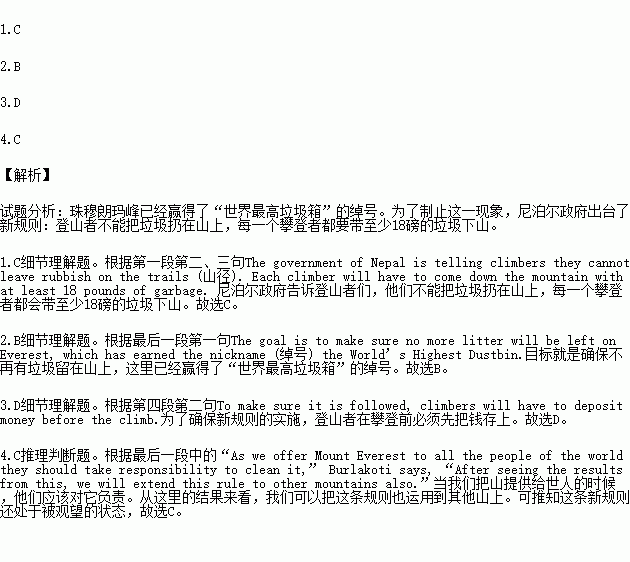题目内容
Climbing Mount Everest, the world’s highest mountain, just became more challenging. The government of Nepal is telling climbers they cannot leave rubbish on the trails (山径). Each climber will have to come down the mountain with at least 18 pounds of garbage. That’s the average amount of rubbish a climber leaves behind on Everest.
Officials say climbers are responsible for their own rubbish. “We are not asking climbers to pick up rubbish left by someone else,” said Maddhu Sudan Burlakoti, who works for the Nepal Tourism Ministry. “We just want them to bring back what they took up.”
More than 4,000 people have reached the 29,035-foot mountain top in the past 60 years. Leaving rubbish along the way helps climbers keep their bags light so they have energy to reach the top. “The rubbish problem in Mount Everest is not new,” Burlakoti says. “When the people started to climb the mountain, they started to leave their garbage there.” They have left behind cans, tents, food wrappers, and equipment. Last year, climbers carried down a total of four tons of rubbish.
The new rule came into effect in April of 2014. To make sure it is followed, climbers will have to deposit money before the climb. Once they climb back down the mountain, officials will check climbers at a return camp to make sure they have the required 18 pounds of rubbish. If they do, their money will be returned to them. If they do not, climbers will not receive their deposit and they will not be given a permit the next time they want to climb Everest.
The goal is to make sure no more litter will be left on Everest, which has earned the nickname (绰号) the World’s Highest Dustbin. “As we offer Mount Everest to all the people of the world they should take responsibility to clean it,” Burlakoti says, “After seeing the results from this, we will extend this rule to other mountains also.”
1.What is mainly discussed in the passage?
A. Mount Everest is suffering white pollution.
B. A new rule was made to punish climbers.
C. Climbers were asked to clean up after themselves.
D. Mountains of garbage are left behind by climbers.
2.Why was a new rule made?
A. The rubbish problem there suddenly became serious.
B. Mount Everest was considered to be a big dustbin.
C. Climbers produced four tons of rubbish last year.
D. The number of climbers there was beyond control.
3.We can learn from Paragraph 4 that _____.
A. the new rule was once discussed in April of 2014
B. those who deposit money first will not be punished
C. all climbers are advised to take rubbish down
D. measures are taken to make sure the rule is followed
4.What can be inferred from what Burlakoti says?
A. The rule is being successfully carried out.
B. The rule is not effective as expected.
C. The effect of the rule remains to be seen.
D. The rule will be applied to other mountains.

